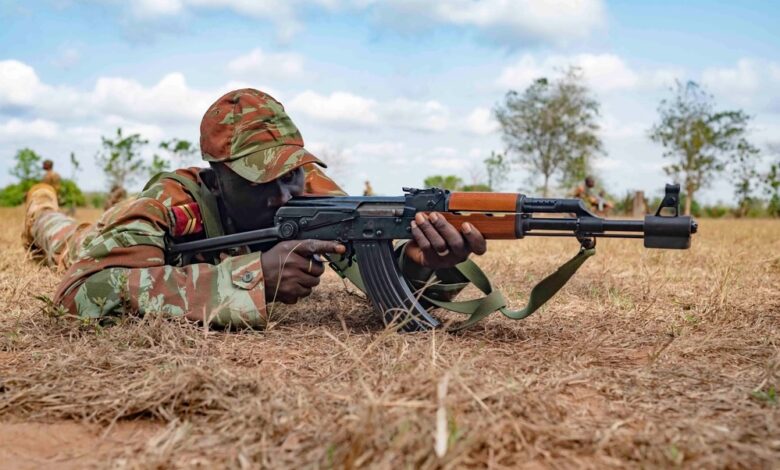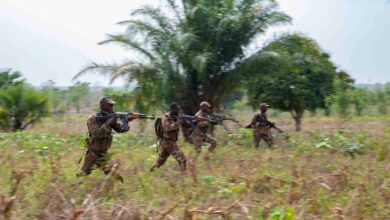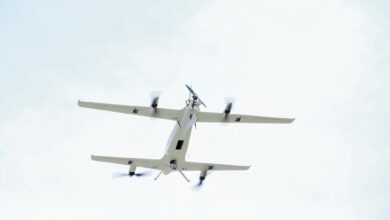
The speed at which terrorist groups have proliferated throughout Africa over the past two decades can hardly be overemphasized. In 2023, reported deaths from militant Islamist violence in the region rose by roughly 20 percent — jumping from 19,412 in 2022 to 23,322 the following year.
Benin, which only recorded its first incident of extremist violence in 2019, is among the continent’s countries being increasingly impacted by terrorism. The number of recorded attacks has risen year-on-year since, reaching 20 incidents in 2022 before doubling last year. The Beninese military labeled 2023’s drastic uptick as “the sharpest rise in extremist attacks in Africa.”
An overwhelming share of this activity has occurred in the Park W-Arly-Pendjari Complex, a vast 1.7 million hectares (4.2 million acres) of land that makes up West Africa’s largest protected wilderness.
The sheer size of this area, alongside its location on the periphery of one of the world’s most violent regions, means Benin has struggled to halt the growing presence of Jama’at Nasr al-Islam wal Muslimin (JNIM), and to a lesser extent Islamic State-Sahel.
Kidnappings in Benin
Evidence of JNIM’s growing presence in Benin is also visible in the country’s increasing rate of kidnappings.
Last year saw northern Benin record at least 75 kidnapping (or attempted kidnapping) incidents, just over triple the number recorded in 2022, which itself witnessed a total higher than the combined number of recorded cases nationwide between 2016 and 2021.
The implications are grave, with kidnappings serving as one of the initial tactics violent extremist organizations frequently deploy to assert presence. Indeed, both JNIM and Islamic State-Sahel typically begin their encroachment into fresh territory by forging alliances with local actors. However, for those less willing to cooperate, methods designed to coerce and intimidate, such as kidnappings, will be used.
This is because they can provide much-needed intel on the local terrain, strike fear into local communities, and announce the presence of an extremist organization as a legitimate violent actor, as well as an additional source of income.
Perhaps most importantly, kidnappings help gradually erode the belief that the state is the primary security provider.

Pre-Existing Grievances
JNIM has found success in northern Benin over recent years, but this says as much about the group’s capabilities as it does about some of the Beninese government policies. JNIM’s expansion would have been far more difficult without the pre-existing grievances in the W-Arly-Pendjari Complex and surrounding areas.
A series of land reforms and sedentarization laws aimed at modernizing its agro-pastoral industry and conserving the local ecosystem, as well as the closure of the Park Complex to the public after two French tourists were kidnapped several years ago, have all been accused of exacerbating farmer and pastoral grievances and conflicts.
JNIM has been able to leverage some of these frustrations to expand deeper into the Park Complex, in turn allowing it to become an increasingly dominant actor in Benin.
Underscoring this notion is a recent study carried out in the Atakora Department, which houses the Pendjari National Park and the largest section of Benin’s border with Burkina Faso. Fieldwork found that 20 percent of participants personally knew someone who had joined JNIM, while 45 percent reported seeing JNIM in their community, and 30 percent had personally interacted with JNIM militants.
Benin now finds itself at a crossroads, although there are several steps the country should take to try to tackle the growing threat posed by violent extremist organizations in its territory.

Address Socio-Economic Pressures
In the Park W-Arly-Pendjari Complex, the government should better address the socio-economic pressures facing farmer and pastoralist communities, even if it comes at a slight environmental cost.
This can be done by declassifying segments of the park’s buffer zones for these communities to use, which would likely alleviate overall levels of conflict and competition.
While this could be a short-term solution, a comprehensive strategy aimed at providing sustainable economic opportunities to the affected areas in northern Benin should also be considered.
Military Cooperation With Neighbors
Benin must also increase military cooperation with Burkina Faso and Niger, the latter of whom the country is currently embroiled in a lengthy diplomatic spat with. With their relationship fraught and Niger facing its own issues with violent extremist organizations, Niamey is unlikely to prioritize terrorist activity near its border with Benin.
This fallout does not only rule out military assistance and cooperation, it has also meant that Niger has kept its side of the border closed for almost a year now. Until reopened, local communities in northern Benin that once relied on cross-border trade will continue to be negatively impacted, further creating socio-economic conditions that are conducive to violent extremists.
While facing its own extensive issues with extremism, Nigeria will be concerned that JNIM militants from the Sahel have transited through Benin and settled in the western Kainji Lake National Park. The threat here is relatively nascent compared to elsewhere in Nigeria, meaning Abuja potentially has a window of opportunity to combat JNIM before it morphs into a far larger threat.
To do so, it will need to cooperate intensely with Benin, and even shoulder more of the burden in attempting to tackle this cross-border threat. Indeed, there is evidence that bandits from Nigeria are now crossing into JNIM-held zones in Benin, underscoring how failing to address this issue will benefit extremist groups traditionally found on opposite sides of the shared border.
Nigeria has ample experience combatting such groups, even if its success in doing so is limited, meaning it must share its experience and knowledge with Benin to implement an effective counter-terrorism strategy that can address all facets of the insecurity multiplying across their shared border.

Western Community Should Help
Finally, the Western community should play a more proactive role in helping Benin.
This should be done via a mixture of civilian and military initiatives. While improving the capacities and size of the Beninese security apparatus will be helpful in fighting extremist groups, providing an outlet for disenfranchised members to leave their groups will be equally productive in the long run.
The US and EU should set up and sponsor disarmament, demobilization, and reintegration programs immediately, as they do elsewhere in the region.
The fate of Benin remains unclear, although it is evident that if trends of the past few years are allowed to progress at their current rates, the country will likely suffer a similar fate as some of its West African peers — many of whom contain some of the highest levels of terrorism and violence in the world.
 Charlie Werb is an analyst, writer, and commentator focussing on sub-Saharan African security issues, with a particular emphasis on Islamist extremist groups in the region.
Charlie Werb is an analyst, writer, and commentator focussing on sub-Saharan African security issues, with a particular emphasis on Islamist extremist groups in the region.
The views and opinions expressed here are those of the author and do not necessarily reflect the editorial position of The Defense Post.
The Defense Post aims to publish a wide range of high-quality opinion and analysis from a diverse array of people – do you want to send us yours? Click here to submit an op-ed.











